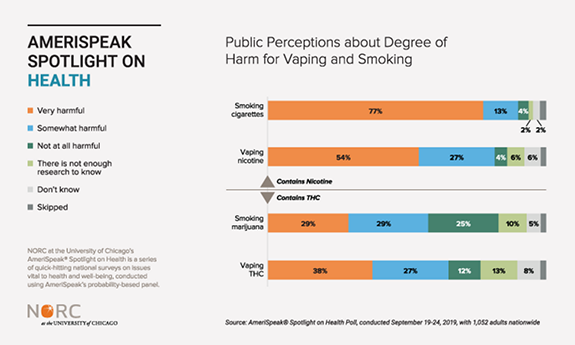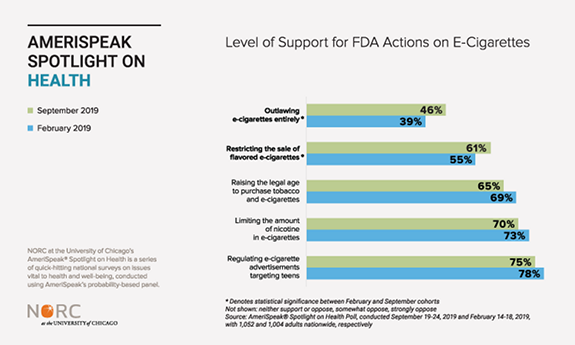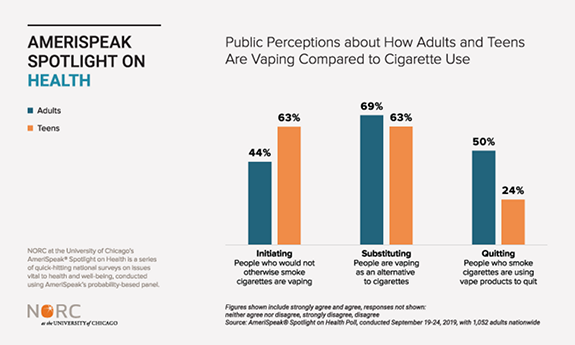Public Believes Nicotine-Based Smoking and Vaping Products Are More Harmful Than Those Containing THC
Following Vaping-Related Outbreak, Support Increases for Restricting Sales of Flavored E-Cigarettes or Outlawing Vape Products Entirely.
CHICAGO, Oct. 3, 2019 – Survey data show that Americans believe nicotine is a bigger public health threat than THC (tetrahydrocannabinol). According to researchers at NORC at the University of Chicago, almost all adults (90 percent) believe smoking cigarettes is harmful, and 81 percent believe vaping nicotine products is harmful. However, only 58 percent of adults believe smoking marijuana that contains THC is harmful, and 65 percent believe vaping THC is harmful.
“Perceptions of risk around vaping THC may be driven by vaping-related illnesses and deaths, since the CDC indicated that three-quarters of the cases are tied to THC products,” said Sherry Emery, senior fellow at NORC at the University of Chicago. “Given how new vaping products are, the full public health risks of all these products may not yet be known.”

Americans are aware of the vaping-related lung illness outbreak.
As of October 1, 2019, the Centers for Disease Control and Prevention (CDC) reports that more than 1,000 cases of vaping-related lung illnesses have been reported nationwide, including 18 patients who have died. Among adults responding to the survey, 81 percent said they had heard about this outbreak. Forty-six percent of those who had heard of the outbreak said they have talked about the risks of vaping with a friend or family member.
Since the vaping illnesses began, numerous policy changes have been proposed at the state and federal levels. At least 10 states have passed legislation this year to increase the minimum age for purchasing e-cigarettes to 21 years old. Massachusetts Governor Charlie Baker suspended sales of all vape products for four months, and several states have imposed emergency prohibitions on the sale of flavored e-cigarettes. The Trump administration has also announced plans to ban flavored vaping products.
Following the outbreak, support rose for restrictions on the sale of flavored e-cigarettes and a total ban of vape products.
Following the vaping outbreak, public support for restricting the sale of flavored e-cigarettes has risen 6 percentage points—from 55 percent of people supporting the policy in February to 61 percent as of late September. Support for banning e-cigarettes entirely rose 7 percentage points—from 39 percent to 46 percent from February to September. Support for other potential FDA actions to limit vaping remains high and figures are statistically unchanged:
- 75 percent support regulating e-cigarette advertising that targets teens
- 70 percent support limiting the amount of nicotine in e-cigarettes
- 65 percent support raising the legal age to purchase tobacco and e-cigarettes
Original results from the February survey can be found here.

People believe e-cigarettes are causing more teenagers to start smoking.
While only 44 percent of people believe that adults who would not otherwise smoke regular cigarettes are vaping, 63 percent of people believe teenagers are doing so.

“More students are using e-cigarettes today than were smoking regular cigarettes in 2011. This suggests that teens have not only substituted vaping products for cigarettes but that students who would not otherwise have used traditional tobacco products are now vaping,” said Caroline Pearson, senior vice president at NORC at the University of Chicago.
Methodology
The self-funded poll was conducted between September 19 and 24, 2019, during a monthly Omnibus survey. It included 1,052 interviews with a nationally representative sample (margin of error +/- 4.24 percent) of adult Americans age 18+ using the AmeriSpeak® Panel. AmeriSpeak is NORC’s probability-based panel designed to be representative of the U.S. household population. A comprehensive listing of all study questions, tabulations of top-level results for each question.
About the AmeriSpeak Spotlight on Health
NORC at the University of Chicago’s AmeriSpeak® Spotlight on Health is a series of quick-hitting national surveys on issues vital to health and well-being, conducted using AmeriSpeak’s probability-based panel.
About NORC at the University of Chicago
NORC at the University of Chicago conducts research and analysis that decision-makers trust. As a nonpartisan research organization and a pioneer in measuring and understanding the world, we have studied almost every aspect of the human experience and every major news event for more than eight decades. Today, we partner with government, corporate, and nonprofit clients around the world to provide the objectivity and expertise necessary to inform the critical decisions facing society.
Contact: For more information, please contact Eric Young at NORC at young-eric@norc.org or (703) 217-6814 (cell).
References
High school vaping rates reported above are based on CDC, U.S. Food and Drug Administration, and National Cancer Institute analysis of data from 2011-2018 National Youth Tobacco Surveys.
More NORC Research on E-Cigarettes
NORC’s Social Data Collaboratory, led by senior fellow Sherry Emery, has been studying public health tobacco control efforts for more than two decades, primarily focusing on health communications research and specializing in analyzing the relationships between tobacco-related media, policy, and health behavior. Our noteworthy project, Tobacco Control in a Rapidly Changing Media Environment (NCI U01CA154254, 2011-2017)—which explored the relationships between tobacco-related information and marketing exposure (on both traditional and new media platforms, including social media), with individual and population-level tobacco-related knowledge, attitudes, and behavior—represented the first large-scale, national survey of new media consumption in the context of tobacco control. The project was incredibly timely and documented the introduction and rise of emerging tobacco product-related marketing (e.g., ENDS, JUUL, JUUL-compatible, little cigars and cigarillos, menthol and flavored products) in U.S. markets. The team published heavily on our findings, which can be found here, and which include several articles on novel social media analytical studies addressing ENDS and vaping product marketing and behavior.




